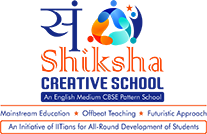EDUCATION IS THE KEY FACTOR WHICH CAN DECIDE THE PROSPERITY OF A NATION.
Education is the key factor which can decide the prosperity of a nation so it is very important to be well equipped with all the basics.
The Sanshiksha group of school aims at inculcating the habit of learning among children with a view to create good human beings, who are capable of taking on the responsibility and obligation that life demands from them.
It provides an opportunity for the parents and children to be knowledgeable about their goals in life. It also provides a platform for academically bright students to showcase their intelligence outside of their class room by providing them opportunities for Inter School Quiz Tournament and cultural activities. The school provides opportunities for students to interact with people from all over the world through programs like student exchange programs, which provides the students with a global opportunity to learn about other cultures.
9th Class Course Curriculum:
- At this age student is mature enough to have long hours of study and other works.
- Mental ability: Mental ability is a must for appearing in any kind of competition and it increase the poor of thinking.
- English Speaking Classes o Easy to crack the interviews o English is a universally acceptable language.
- Mathematics two layers faculty
Since maths is very important for the students so we have created two layers of teaching for maths o First level: students are taught from basics according to the school syllabus. o Second level: few of the selected students will be given the second level of conditioning for Olympiads and other competitions o Extra classes for underperforming students.
- Career Counselling from the early age o We will expose the students with various fields of interests so that student might be able to select the right career according to his/her orientation.
- Guest lectures for guidance and Motivation o We have a team up with many professionals who are experts in theirfields. They will Guide and share the knowledge with the students on regular basis.
- Self-studyhabit: we will also develop the habit of self-study which lacks in students nowadays.
- Sports will be compulsory for all the students. (We believe that with0ut being physically fit you cannot be mentally fit.)
- Extra curricular activities like Developing leadership skills, public speaking, Music, Writing etc.
- Olympiads, so that students start to get the idea of completions from the early age.
- English
- Maths
- Physics
- Chemistry
- Science
- Biology
- Astronomy
There will be optional classes for professional courses entrance Examinations.
- Engineering
- Medical
- Fashion Designing
- Coding
- NDA
- Clat
- CA
- MBA
- Journalism
AIM of the course class 9th:
- To inculcate basic scientific, mathematical, historical and geographical knowledge through subject based learning.
- To inculcate the habit of learning and the ability to think analytically, critically and creatively and to analyse information from different sources.
- To develop an appreciation for art, culture and music, which in turn enriches their lives.
- To develop in them respect for people with different points of view; to develop tolerance of all kinds of people irrespective of caste and creed;
- To develop an appreciation for the sciences, arts and humanities through exposure to a variety of subjects and to have the ability to compose original research-based papers.
- To develop in them an interest in attending scientific lectures, seminars, workshops and symposia.
- To develop in them an interest in people from other countries by participating in student exchange programs organized by the school and by exposure to a variety of cultures through activities like tours organized on their behalf.
What is the teacher's role?
- A catalyst for the child.
- An observer of what is going on with the child.
- A mentor for the child who takes an active interest in the child's work and progress.
- A facilitator and supporter of children's independent work.
- One whose role it is to communicate and transmit knowledge to children, who in turn should be generating questions based on their own observations, personal experiences and life situations.
What is the student's role?
- A learner of knowledge, with a desire to exhibit independent and enquiring minds in the process.
- A participant, who actively participates in the learning process and that which is taught.
- A class monitor, who helps maintain order in the classroom.
- One with an ability to revisit information learnt and re-evaluate it according to new developments and situations.
- One who wants to learn.
- An individual who is ever going to be intellectually curious.
- An independent learner who seek opportunities to learn and exercise their learning.
- A self-actualized individual who develops a sense of fairness and justice.
- One who understands the impermanence of life.
- One with a sense of the past and is able to appreciate other cultures.
What is the school's role?
- To create an environment conducive to learning which is both challenging and supportive so that the child develops a desire to learn.
- To help children become aware of their own strengths and weaknesses, which in turn helps them decide on the area(s) they want to develop further.
- To provide opportunities for children to interact with their peers who, in the process allow them to bring out the best in themselves.
- To help children to appreciate what is good about them and to develop personal skills and the ability to confront problems.
- To provide perspectives for problem-solving skills.
- To enable children to reach a level of self-confidence and self-respect, so that they have the confidence within themselves to tackle problems which are above their capabilities by themselves.
- To inculcate a sense of belongingness within the child so that they feel accepted in society and developed as an individual who is part of an extended family.



